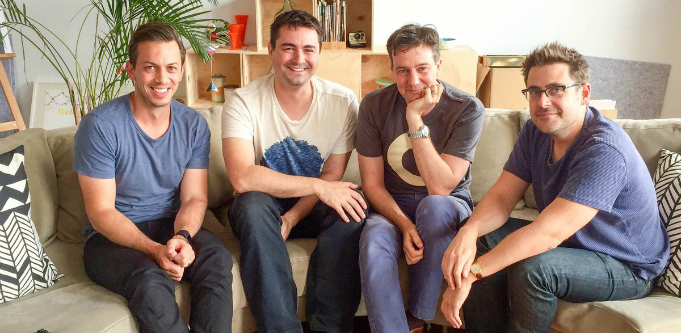
Culture Amp co-founders Rod Hamilton, Doug English, Didier Elzinga and Jon Williams.
Conquering the “impossible”, reinvention and purpose are core elements in scaling a startup from zero to $1 million, to $10 million and beyond, says Culture Amp chief executive and co-founder Didier Elzinga.
After launching as a tiny Melbourne startup in 2009, Cutlure Amp has grown into a global software giant with more than 100 employees across four offices, including one in San Francisco.
“We’re working with almost a thousand companies globally,” Elzinga tells StartupSmart.
Having secured $US10 million ($13 million) in Series B funding in March 2016 and reached more than $10 million in turnover, Culture Amp is entering its next major growth phase with a goal to generate $100 million in revenue in the next four years.
Startups and scale-ups that are doubling or tripling growth year-on-year have a unique set of challenges to overcome, says Elzinga.
“It amplifies everything: the good and the bad,” he says.
“At that rate of growth you can go up really quickly and you can go down really quickly.”
So what does it take to successfully scale a venture from scratch? Elzinga shares four tips fast-growing startups.
Starting at zero: “Sticky tape and wire”
When a startup is just learning how to walk, Elzinga says the key focus should be on finding a “painful” problem and creating a solution so valuable that even in its “sticky tape and wire” version, it draws demand.
“Really early on, it’s an interesting situation because you’re starting with nothing,” says Elzinga, who started Culture Amp with three software engineers.
“By definition you’re way behind the eight ball.
“Early on, the question is not, ‘can you build it?’, it’s, ‘will anybody care?’” he says.
Growing from $1 million to $10 million in turnover: Scaling operations
Scaling a startup from $1 million in turnover to $10 million is “really, really hard”, says Elzinga.
“You almost die twice,” he says.
“You’ll have to rebuild the company several times.”
This means building processes and systems and scaling operations to keep up with rapid growth, he says.
“But the good thing is you’ve already done the impossible bit,” he says.
Elzinga says scaling a startup from zero to $1 million is the “impossible” piece, while the second stage of growth is just “really hard”.
And it’s okay, he says, because “everyone is on fire too”. Many startups and tech companies experience similar challenges as they grow, he says.
Unfortunately, many fast-growing ventures mistakenly believe they’re the laughing stock of the sector because their “processes are so broken”, says Elzinga, but the reality is at this rate of growth, most companies struggle.
“Suddenly, there’s a hundred things you can do,” he says.
“The best companies carefully choose which part of the problem they’re going to solve.”
Move fast but don’t jump the gun
Rapid growth also often means hiring more people. When growing a team of two to 30, and then to 100 and beyond, Elzinga says “right sizing” systems and processes is crucial.
“Recognise when you’ve outgrown what you needed as three people and [at the same time, don’t go] to what you need when you’re 300 people … that’s a constant battle for people to keep their eye one,” he says.
Consider if it’s worth hiring new staff or if it’s better to invest in products or tools that are easy and quick to set up, he says.
If a startup’s planning to develop its own tech solutions, Elzinga says, it’s important to ask: “Is that actually the core value you’re creating for the client?”
“Don’t try and reinvent the wheel … focus on the stuff that only you can do,” he says.
Soaring to $100 million and beyond: Remember your purpose
According to Elzinga, “$100 million in revenue is somewhat of a magic number for technology startups because it’s a [milestone] in your revolution”.
But starting out with only a simplistic financial target is not the way to go, he says, because the venture’s underlying purpose is what really matters.
“We build software to help build culture-first companies and we obviously want to be a culture-first company ourselves,” he says.
As Culture Amp continues to develop more sophisticated features and data analytics for a wider range of businesses, Elzinga says its underlying purpose remains.
“The opportunity in the next wave is to really go beyond that and to help those companies not just understand where the issues are but to work out how to move forward on them … people and culture is a universal problem,” he says.
Follow StartupSmart on Facebook, Twitter, LinkedIn and iTunes.


COMMENTS
SmartCompany is committed to hosting lively discussions. Help us keep the conversation useful, interesting and welcoming. We aim to publish comments quickly in the interest of promoting robust conversation, but we’re a small team and we deploy filters to protect against legal risk. Occasionally your comment may be held up while it is being reviewed, but we’re working as fast as we can to keep the conversation rolling.
The SmartCompany comment section is members-only content. Please subscribe to leave a comment.
The SmartCompany comment section is members-only content. Please login to leave a comment.